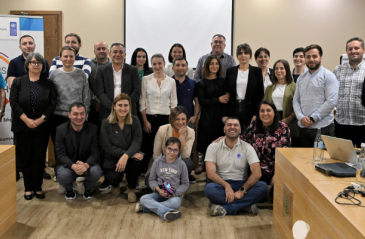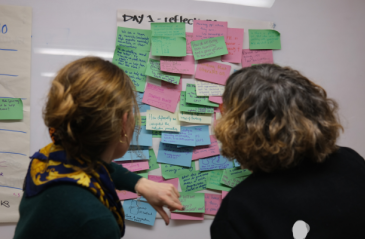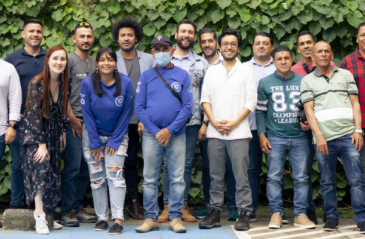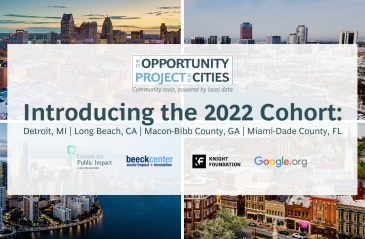
Learnings from Urban Imaginaries – Georgia

We put our vision for government into practice through learning partner projects that align with our values and help reimagine government so that it works for everyone.
Kemi Adeosun has been Nigeria's finance minister for under a year, but her in-tray has not lacked for challenges. Talk about in at the deep end: low oil prices, rising unemployment, longstanding governance problems and, more recently, confirmation that the economy has fallen into recession - all this has led to long days and new priorities aplenty.
Amidst this flurry of bad news, Nigeria's abundant strengths should not be forgotten. From rich natural resources to its growing population (Africa's largest), an emerging middle class to a diversifying economy, it is clear that the country possesses many of the ingredients needed for any developing country to accelerate into calmer, more prosperous waters. So how can it get there?
Nigeria plans to be one of the leading economies in the world by 2030. It's a bold, admirable ambition, but turning this idea into reality requires many different elements, not least the deployment of new and enhanced infrastructure.
"We are hungry for new infrastructure," admits Adeosun, before going on to cite as an example the unwelcome fact that 170 million of her fellow citizens still live without power. "We have got to move from a consuming economy to an investment-driven economy, and infrastructure is critical to that. Unfortunately, the problem with Nigeria in the past is that even when oil prices were as high as 110 dollars a barrel, we weren't investing in our infrastructure."
She and her colleagues are trying to change that - but there remains some way to go. "In the short time this government has been in office, we have tried to redirect public spending to infrastructure. But our infrastructure deficit is huge and the calculations we have done show that, even if we devoted our entire budget to infrastructure for the next five years, we can't plug the gap. This means we need to look for some creative ways to mobilise additional spending. The first thing we have got to do is re-establish our ability to deliver on roads, on rail and on other basic infrastructure. But the long-term plan is to mobilise private capital."
The need to combine both the public and private sectors mirrors Adeosun's own career arc. Born in Britain, she began her career - appropriately enough - in financial management, working as an accounting assistant at British Telecom. Subsequent financial roles in the UK followed before moving to Nigeria after her husband's business relocated. Once back home she continued to work in financial management, including a role as a newspaper columnist and running training programmes for women. This activity attracted the attention of the governor of Ogun state who appointed her as his finance commissioner, a position she held for four years until her ascent to the role of finance minister in November 2015.
Now, from her position behind the ministerial desk, she is seeking to bring new investment into the country. "The narrative around who pays for infrastructure is a very important one in Africa, because I think there is a sense or expectation from the people that government will deliver infrastructure. Certainly, there are some fundamental areas of infrastructure that only government can provide, but at the moment even if you don't have infrastructure, you're paying anyway. The public don't have roads but they still pay: you take four hours on a journey that should take an hour, and you still pay. How we convert that payment - which is currently informal - into a formal payment and therefore a revenue stream that can attract investors is the challenge we are working on. To do that we are looking at a regulatory framework that will enable investors to come in."
She goes on to say that the influx of such private sector capital is absolutely vital. "We recognise the need to attract private capital to get some additionality into the infrastructure spend, because government cannot do it alone," she explains. "I think that Nigeria is symptomatic of the rest of Africa, and we are too far behind to simply retrace our steps. So what we need is an enabling environment that can help more money to be pumped in, as well as bankable projects and consistency of policy from the multilaterals."
To illustrate her point, she cites the example of balancing the need to address climate change with making the most of Nigeria's deep reserves of coal. "We have power problems, so it doesn't take a genius to work out that it would make sense for us to have some coal-fired power plants."
She further reiterates the fact that Africa has been blocked from using coal-based technology to shore up its power deficit because it is not a green venture. "Western industrialised countries have been built on coal-fired energy and that is the competitive advantage that has been used to develop economies and regions. Africa would like to explore this, but unfortunately this is the era of climate change and the need to go green. The only open option here is to go solar - which is the most expensive power option. So yes, Africa must invest in its infrastructure, but with a level playing field."
If it were not to do so, she continues, it would force the continent into a "destructive cycle" of underdevelopment. "The West will continue to be more competitive than us in light manufacturing, and although we are trying to catch up we're having our hands tied behind us," she says. "If they don't want us to do coal, that's fine, but someone has to compensate us for the difference. At our stage of development, we shouldn't be burdened with the additional cost of going green when those who polluted the atmosphere are continuing to use coal."
Such frustrations aside, it is clear that Adeosun is relishing her role and the opportunity to make a difference. Her eyes are very much focused on the long-term horizon - no short-term fixation here - and she is encouraging potential investors to adopt a similar perspective. "Infrastructure in Africa does offer attractive long-term returns," she concludes.
"Africa should no longer be seen as a market for the world to sell finished goods to - it's not good for us and it's not good for the West. Instead we need public-private partnerships to be extended across international waters to enable patient money to come in and stay for the long term. This is a far better route to the sustainable progress we all seek."










